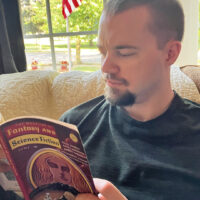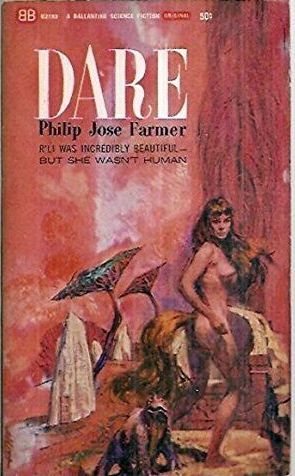Is ten books a record for the Galactoscope? Lucky we have so many folks reading furiously for the Journey. And it's a good thing, because amidst the dross and mediocrity, there's a couple of gems…

by Tonya R. Moore
Let the Fire Fall by Kate Wilhelm

Kate Wilhelm is perhaps better known for her debut short story, "The Mile-Long Spaceship" (1963) and Clone (1965), the Hugo Award nominated novel written in collaboration with Theodore L. Thomas. Perhaps you've read her work in Orbit, edited by her husband, Damon Knight.
The ominous title of this book, Let the Fire Fall, promises fire, brimstone, and a violent alien invasion—but the bad guys in this story aren't the extraterrestrials. The plot: A spaceship inhabited by pregnant alien women lands in small town America. The aliens are friendly, and clearly hope to be welcome on this new planet they’ve discovered. One vile and opportunistic man named Obie Cox– under normal circumstances, a small-town philanderer of no account, blessed with uncommon charisma–manages to worm his way to the pulpit. One there, he takes advantage of humanity’s rampant xenophobia and the ineffectuality of Earth’s bureaucracy through flat-out lies, hate, and fear mongering. What he wants is control and he achieves that by weaponizing humanity’s worst traits and using them to brainwash the populace and plunging the world into dystopian chaos.
At first, Wilhelm’s strangely familiar-feeling and deliberately matter-of-fact writing style, peppered with many clever twists of phrase, seems to capture the spirit of Ray Bradbury or an episode of the Twilight Zone. What we get, instead, is a riveting and decidedly tragic tale of First Contact gone awry in a world populated by an almost irredeemable cast of humans.
Wilhelm’s courage and ambitiousness in attempting to capture the vile side of human nature is admirable. Still, even a forward thinking and imaginative author such as herself cannot seem to escape the discriminatory views of our time. Let the Fire Fall perpetuates the sexist view that women must be submissive to men and even the women important to the plot are given no initiative to steer their own destinies. While Wilhelm is progressive enough to acknowledge the existence of homosexuals, the way she characterizes homosexuality as one of the “vices” permitted by the villainous Obie Cox’s vaunted religion suggests a personal disapproval of such individuals. (To be fair, what her characters feel, even the "good" ones, doesn't necessarily reflect Wilhelm's feelings on a subject.)
In any wise, Let the Fire Fall is an excellently written novel. The author’s insight and ability to imagine a dark future, all too possible, are incredible. I love this book but I hated reading it. The way it mirrors our current reality where opportunistic charlatans have risen to political power by preying on the gullibility of the American populace fills me with trepidation. Let the Fire Fall is an insidiously horrifying and damning condemnation of the human race. This book will make you squirm and fret about the world as we know it, and the future of our species. You will not feel comfortable reading this book. You should not.
4 out of 5 stars.

by Mx. Kris Vyas-Myall
The House on the Strand by Daphne du Maurier

cover by Flavia Tower
Daphne du Maurier has been a favourite of mine for a long while. I read Rebecca in my teens and have slowly been building up a collection of her writings. However, she has only had one truly SFnal release to date, the marvellous collection The Apple Tree, most notable for containing the original short story of The Birds.
That was until this year, when she followed in the footsteps of fellow literary darlings Naomi Mitchison and Virginia Woolf and put out a book on a mainstay of science fiction, time travel.
Dick Young goes down to visit his old university friend Professor Magnus Lane in Cornwall. Dick agrees to be the test subject of the Professor’s new alchemical invention and finds himself transported back in time to the era of Edward III’s infancy. The story follows Dick and Magnus’ trips back and forth between the 14th and 20th centuries.
What Du Maurier always does well is give a real sense of atmosphere to her tales. As is usual in her books Cornwall takes on the mysterious atmosphere of Bronte’s Yorkshire and Doyle’s Dartmoor: a strange wild place where anything can happen. She also illustrates well the sense of dislocation Dick feels moving between the periods, making him feel like an outsider in both.

Cover by Susan Einzig
And yet, I don’t feel like it did anything particularly new or interesting here. The children’s book Tom’s Midnight Garden explores similar themes better for me. Also, in spite of the period being underserved in historical narratives, I didn’t feel like I gained much more insight or understanding of it than I would have done from an encyclopedia summary.
This almost reads like one of those historical stories that had a touch of added SFnal content to get into the magazines. Of course, that is not the case here (DuMaurier could release her shopping list and it would be a best seller) and this is still a good read, but I did not feel like it is doing anything exceptional nor is it destined to be one of my favourites.
Three Stars
New Writings in S-F 14 ed. By John Carnell

As John Carnell has now edited as many editions of New Writings as Ian Flemming wrote James Bond novels, he is entitled to enjoy himself. As such, he says this volume is entirely composed of stories he personally loved, rather than mixing in some he knew were good but not to his taste. But how much do my feelings ally with his?
Blood Brother by James White
We start with the always reliable James White with another tale of Sector General.
Following on from Vertigo, a team is returning with Surreshun to “Meatball” to assess the species' medical needs and to locate the manufacturers of their responsive organic tools. Unfortunately, the native entities of the planet believe that Surreshun was kidnapped by the crew of the Descartes and are not keen to let this happen again.
This once again is a fascinating exercise from White, trying to imagine a wholly alien species from our understanding and the problems it could cause. The natives of “Meatball” have an inbuilt dislike of anything similar to themselves and have no central form of government but exist in a deep layer of animal life. How to communicate ideas like friendship to a species like that is a true challenge.
What White is always great at is giving us a sense of how diverse the species in the Galactic Federation are, whilst still making it seem like an everyday occurrence at the hospital. For example:
Despite the fact that one species was covered in thick silver fur and crawled like a giant caterpillar and the other resembled a six-legged elephant, they were fairly easy to deal with because they had the same atmosphere and gravity requirements as Conway. But he was also responsible for a small ward of Hudlars, beings with hide like flexible armour plate whose artificial gravity system was set at five Gs and whose atmosphere was a dense high-pressure fog – and the odd-ball TLTU classification entity hailing from he knew not where who breathed superheated steam. It took more than a few hours to tidy up such a collection of loose ends…
He continues to know what he does well and produces the most consistently strong series currently ongoing in Science Fiction.
Four Stars
If You're So Smart by Paul Corey
Ibby has a mental disability and suffers from regular seizures, so lives permanently at a mental hospital. He also helps out in the animal testing lab. However, he may be able to understand the animals better than the scientists.
A pedestrian tale, poorly told. Whilst I have heard that Corey is an American writer and journalist of some renown, I am only familiar with him from his awful appearance in New Worlds earlier in the decade. Apparently he has an SF novel out from Robert Hale but this isn’t inspiring me to pick it up.
A low Two Stars
The Ballad of Luna Lil by Sydney J. Bounds
Gerard The Rhymer wrote The Ballad of Luna Lil many centuries ago. This work analyses the historical accuracy of the tale to the real life of Captain Bartholomew “Black Bart” Sparrow, a space free trader, and Lily La Lune, singing star of the videos.
I am a great lover of analyses of fictional works and this one doesn’t disappoint. It turns what could be a standard pulpy adventure into an exploration of a fictional universe, containing fascinating ideas and raising questions about the power of art.
A high Four Stars
The Eternity Game by Vincent King
In a tale told from four perspectives (A, G, P & Z), two different species find themselves in the Place, attempting to survive in their collapsing galaxy.
We learn from the introduction that Vincent King is also a visual artist and Carnell describes this work as being like an abstract painting. I am not sure I agree with that, it is certainly not as obscure as some of the writings of Ballard, Burroughs, or Farmer. Rather, you have a puzzle that fits together by the end.
I don’t think it is quite as effective as his usual Medieval Futurism, but still a worthy piece.
Four Stars
Tilt Angle by R. W. Mackelworth
The Earth has entered a new Ice Age, and Tomas and Donna are sent on a mission from the City to find food stores. But is this parasitic existence right or sustainable?
Another one of these Frozen Earth tales that have been popping up a lot recently in the UK (we do like to moan about the weather). Whilst evocatively told, it feels abrupt and incomplete. I wouldn’t be surprised if we saw further stories in this world.
Three Stars
The Song of Infinity by Domingo Santos
Once again we have a work in translation, this time from a Spanish author. He is apparently well known in his own country but I am not aware of any prior translations into English. This one was selected and translated by the late great Arthur Sellings.
We get the internal monologue of an astronaut who finds himself accidentally floating through space without any hope of rescue.
This is a well told and melancholic tale but one that nevertheless didn’t really affect me as much as I felt it was trying to.
Three Stars
Green Five Renegade by M. John Harrison
Astronaut of the Green 5, Chad Redeem, encounters alien life forms. Discovering them to be naïve and peaceful compared to the human race, he goes on the run rather than risk his knowledge of them becoming known to the authorities.
Oh dear, I am not sure what happened here. Even putting aside some weird printing errors, it is overwritten, cliché driven and full of creepy descriptions of women. I know Harrison can do a lot better so I am surprised to see this come from his pen.
One Star
So, the good ship New Writings continues steadily on its course. Some good works, some poorer, still generally very much in Carnell’s usual mode. Much the same crew manning the rigging with nary a woman in sight*. Whilst it may not always be the most exciting voyage, it shows little signs of leakage. Onward!
*I believe it has now been over 5 years since Carnell published a story by a woman, the last being Dial SCH 1828 by Gweneth Penn-Bull in December ‘63’s Science Fantasy.

by Gideon Marcus
Ace Double 72400

The High Hex, by Laurence M. Janifer and S. J. Treibich
Here is the sequel to Target: Terra that nobody asked for. In this one, the African space station has begun broadcasting a menacing message, all chants and tribal drums, that seems to presage a heating up of the White/Black cold war. The crew of Space Station 1 are recalled to duty and tasked with infiltrating the second station. The plot is thickened with robots and destructive aliens, and the Africans aren't the bad guys after all.
If you enjoyed the gaggish and frivolous tone of the first book, you'll like this one. Otherwise…you won't.
Two stars.
The Rim Gods, by A. Bertram Chandler
If you read and enjoyed the four stories of John Grimes, a space captain running the rim of galactic space, then this is an opportunity to get all of them in one convenient package. In this fix-up, they are unchanged, with only short concluding scenes added to each piece to link them together.
They all appeared in IF, where David gave them three stars apiece. I see no reason to change his assessment.

by Victoria Silverwolf
War And No Peace
Two new novels deal with armed conflict, international or domestic. One takes place in the very recent past, but not the one with which we're familiar. The other is set in the near future, one we'd like to avoid. Let's start with something that didn't happen less than two years ago.
If Israel Lost the War, by Richard Z. Chesnoff, Edward Klein, and Robert Littell

Uncredited cover art.
In the tradition of Bring the Jubilee (1953) by Ward Moore (the Confederacy wins the American Civil War) and The Man in the High Castle (1962) by Philip K. Dick (the Axis wins the Second World War), this book reverses the result of a war.
The title makes that obvious, of course. We're talking about the so-called Six Day War (June 5 through 10, 1967), in which Israel triumphed over a coalition of Arab nations.
I know less about military stuff than almost anybody, so I won't try to analyze the war. However, there seems to be general agreement that Israel's preemptive strike, devastating the Egyptian Air Force and giving Israel complete control over the skies, was a key factor in the victory.
What if Israel didn't attack first? What if Arab forces destroyed most of Israel's air power instead?
That's the premise of the novel. The result is overwhelming victory for the Arab nations, with Israel's territory soon being divided up among them.

The book's map, showing the progress of the imagined conflict.
The occupying forces initiate a reign of terror. As in many wars, looting, rape, and murder follow the victory. The big winner is Egyptian President Gamal Abdel Nasser, who dominates his allies and intends to create a new, bigger United Arab Republic.
(The UAR was the name given to the union of Egypt and Syria from 1958 to 1961. The United Arab Republic is still the official name of the nation better known as Egypt.)
As I said, I'm no expert on war, so I don't know how plausible this scenario might be. It assumes closely coordinated action among the Arab states, which is questionable. It also presumes that Arab aircraft would be able to bypass Israel's early warning defense system. (There are even some lines in the book that indicate that this is unlikely.)
So how is the book as a work of fiction? Well, given the fact that the three authors are journalists (all working for Newsweek), it's no surprise that it reads like nonfiction. There are a few minor fictional characters, but all the major ones are real people. We follow politicians and military leaders from Israel, the Arab nations, the USA, and the USSR.
The work is obviously very pro-Israel. (Richard Z. Chesnoff is married to an Israeli woman, and used to live on a kibbutz.) Whether one sees the book as reasoned justification for Israel's preemptive strike, or as anti-Arab propaganda, it is sure to stir up controversy. Judged strictly on its literary merits, I'd have to say that it's readable enough. The authors are definitely more interested in getting their message across than in creating a work of art.
Three stars.
The Jagged Orbit, by John Brunner
Let's turn from an imaginary past to a speculative future.

Cover art by Diane and Leo Dillion.
The race problem in the United States is much worse in the year 2014 than it was in our own time. Some cities (Detroit, Washington, etc.) are under the control of kneeblanks, while others are still firmly dominated by blanks.
Oh, you're not familiar with those terms? Maybe it'll help if I point out that blank is derived from the Afrikaans word blanc (white) and that kneeblank (often just knee) comes from nieblanc (not white.)
This is a sample of the book's futuristic terminology, which takes some time to get used to. It's not as difficult as the slang in A Clockwork Orange (1962) by Anthony Burgess, but it requires a little effort.
Anyway, ordinary citizens are forced to defend themselves with serious weapons, supplied by arms dealers. The dominant supplier of deadly devices is a family-run corporation that resembles the Mafia.
That's the background. What about the story? Well, it's complicated. There are a lot of important characters and a lot of plot threads. Let me try to come up with a greatly oversimplified synopsis.
There's a psychiatric institute under the direction of a megalomaniac who treats his patients with extreme isolation from society. One of the inmates is a kneeblank soldier who suffered a breakdown in war, but who now seems perfectly sane. In fact, he's an electronics genius.
A woman who produces enigmatic prophecies while under the influence of drugs (as in ancient times, she's called a pythoness) performs at the institute. A fellow who exposes scandals on television (the book calls him a spoolpigeon) records her act. He also happens to be married to one of the patients.
Meanwhile, a kneeblank spoolpigeon gets kicked out of Detroit by the city's kneeblank mayor, at the instigation of a blank South African. (The tragic situation of apartheid is still going strong in 2014.)
In addition to that, a kneeblank revolutionary who put kneeblanks in control of much of the United Kingdom is on his way to the United States. Even though US officials are terrified of him, he easily gets through customs.
What does this all have to do with a secret project of the arms dealers? Suffice to say that the kneeblank soldier I mentioned above isn't what he seems to be.
I've only given you a vague hint of what the novel is like. In addition to the convoluted plot, there's the narrative style. The first two chapters, for example, consist of a single word split into two parts. Many of the chapter titles are very long and often satiric. In the middle of the book, Brunner provides quotes from real newspaper articles about the American race problem.
The climax involves science fiction themes that are more speculative than those found earlier in the book. These may strain the reader's suspension of disbelief.
This novel isn't as groundbreaking as the author's stunning masterwork Stand on Zanzibar, but it's pretty close in quality.
Four stars.

by David Levinson
A Familiar Refrain
In music, it’s common for artists to cover an old standard or just something someone else has already done. Usually, they have a different approach that may be about the same, worse, or better. Once in a while, they’ll take an old song and make entirely their own (Jimi Hendrix and Frank Sinatra have a singular talent for this).
There’s a similar phenomenon in science fiction. Someone comes up with an interesting idea—time travel, alien invasion, what have you—and eventually almost everybody tries to see what they can do with the concept. Harry Harrison’s latest novel is just such a work. How well did he do?
Captive Universe, by Harry Harrison
 Art by Paul Lehr
Art by Paul Lehr
Two Aztec villages lie on either side of a river in a valley long isolated from the outside world. We soon learn that things are not as they seem. The serpent-headed goddess Coatlicue is a physical presence that stalks the river bank at night, and typical Aztec features include blonde hair and blue eyes.
Into this world is born Chimal, a young man with a penchant for asking uncomfortable questions. When he inadvertently causes the death of the high priest (and the sun fails to rise, because there is no one to say the necessary prayer), Chimal must flee the valley. The society he finds outside the valley is no less hidebound and no fonder of questions with uncomfortable answers.
Although I’ve talked around it for the benefit of those who would like to experience the surprise on their own, I suspect many of you have figured out what’s going on. Although Harrison adds one or two interesting flourishes, the novel follows the expected course to one of the standard endings. Indeed, the story follows such a predictable course, I found myself more interested in what happened centuries earlier to create the situation or what is going to happen a few decades after the end.
Is it worth your time? Maybe. Is it worth your money? Definitely not, especially not at hardback prices.
Three stars, but not recommended.

by Brian Collins
Spacepaw, by Gordon R. Dickson

Cover art by Leon Gregori.
Dickson has been busy as of late, with his serial Wolfling currently running in Analog, and with a new paperback original alongside it. Spacepaw is a less serious novel and seems to be aimed at a younger readership, which is fine by me. It takes place on Dilbia, the same planet featured in Dickson's 1961 novel Special Delivery. Like that earlier novel it features the Dilbians, a race of nine-foot-tall bear-like aliens who are not exactly hostile but who certainly have a curious way of going about things.
Bill Waltham is an agriculture scientist sent to Dilbia, supposedly to meet up with Lafe Greentree, his on-site superior, and Anita Lyme, a "trainee assistant" working under Greentree. The problem (actually two problems) is that Greentree is not here: he had sustained an injury whose severity the off-planet hospital is strangely vague about disclosing, and Anita has been taken captive by a pack of Dilbian outlaws. The only possible help Waltham can get are the mischievous Dilbian the Hill Bluffer (that's his name, the Hill Bluffer) and a Hemnoid named Mula-ay (italics not mine). The Hill Bluffer is not terribly useful and Mula-ay seems to be working for a third party—in Waltham's favor or not remains to be seen.
This novel is basically a comedy of manners. To rescue Lyme and convince the Dilbians to pick up agricultural skills (the race is a rural lot that lives off the fat o' the land), Waltham will have to adapt to Dilbian customs. The black-furred giants are a comical lot, with silly names like More Jam, Perfectly Delightful, and Grandpa Squeaky; they even give Waltham a Dilbian name, "Pick-and-Shovel," which the serious-minded human does not appreciate. The leader of the outlaws, Bone Breaker, is pretty affable despite his name and occupation. The stakes are kept somewhat low, even when Waltham is duped into accepting a duel to the death, which is fitting for a comedy, even if doesn't leave the reader with much to think about.
Dickson's brand of humor is unlikely to spark laughter, but it's effective at often invoking a smirk. Waltham himself is a bit of a wet blanket, but the comedy mostly stems from this straight-laced hero type being forced to deal with some deeply unserious aliens. Lyme is a bit of a shrew, but Dickson does write her as competent and independent-minded, even if I suspect he does not think very highly of her.
A solid three out of five stars, possibly four for young readers.
The Tormented, by Dorothy Daniels

Cover art by Jerome Podwil.
A good deal less enjoyable is a new Gothic horror novel I picked up, by an author I've never heard of before. Despite having been published this year, The Tormented reads like a fossilized dinosaur, but not one of the interesting ones. It's a pastiche of late-19th century supernatural horror. I'm sure Daniels likes Henry James and Arthur Conan Doyle, but unfortunately she is not remotely as good a wordsmith as James or even Doyle.
Sharon Aldrich lived on a New Orleans plantation called The Pillars until both her parents died, and it turns out all the money had dried up. After a stint or two abroad she returns to The Pillars as governess for a new family that's moved in, the Beaumonts. Craig Beaumont and his wife Emily are stuck in a loveless marriage while Emily's sister, Sarah, tags along as a third wheel. Cassie, Craig's daughter, is a reasonably well-adjusted child despite the fact that she had witnessed a horrific death in the family not long ago. And there seems to be a ghost problem on the plantation. The place is most certainly haunted (it takes all of about five minutes upon Sharon's arriving for a ghost to start whispering in her ear), and worse yet, Sharon must now deal with a dysfunctional upper-class family.
You would think that at only 160 pages this would be a densely packed narrative, but it's not. There's quite a bit of padding. Most of the wordage is dialogue, with characters often getting into arguments with each other and then almost immediately apologizing for causing a fuss. Emily and Sarah are major shrews, and Sharon is not much better. It soon becomes clear Sharon and Craig like each other but are hesitant to take action, what with the whole marriage thing. Even the ghost does not pose much of a threat. No wonder the Confederacy lost. The Tormented is probably a few thousand words longer than James's The Turn of the Screw, but feels shorter because it spins its wheels so often. Not much actually happens, and despite the New Orleans setting Daniels injects practically no atmosphere into her writing.
The most damning part is that this is 1969, not 1889. I kept thinking, "Why play such an old and tired genre straight? What point is Daniels trying to make by doing this?" After having read the whole thing, I still don't know.
Two out of five stars.





![[April 16, 1970] Junk Day for Ice Crowns (April 1970 Galactoscope)](https://galacticjourney.org/wp-content/uploads/2025/04/700420covers-672x372.jpg)
![[February 18, 1969] (February Galactoscope)](https://galacticjourney.org/wp-content/uploads/2024/02/690218covers-672x372.jpg)












 Art by Paul Lehr
Art by Paul Lehr




![[February 26, 1965] Dare to be Mediocre (February Galactoscope #2)](https://galacticjourney.org/wp-content/uploads/2020/02/650226covers-655x372.jpg)







